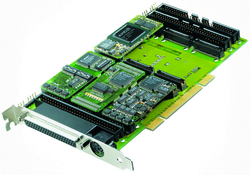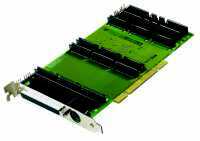MAX6pci
MAX6pci
- Non-intelligent carrier card for PCI
- 6 slots for MAX modules
- Can be upgraded at any time to an intelligent card through plug-in CPU modules such as the X-MAX-1
- Multi-processor capability through multiple CPU modules
- As an intelligent card it works in parallel with the PC's CPU
- Stand-alone operation possible
- Creation of real-time programs with Borland C and Pascal compilers
- Convenient development environment, RTDS, including source-level debugger for Windows is included
- Drivers for Windows (3.1x/95/98/ME/NT/2000/XP) and Linux
Description
Carrier card for MAX modules
The MAX6pci is a carrier card for MAX modules. It can be operated in any PC with PCI slots, either as a passive card or, when fitted with MAX modules with CPU, as an intelligent card. MAX modules are simply plugged in according to the particular need for inputs and outputs or for computing power. The MAX6pci carrier card connects the PCI bus of the host PC to the onboard X-Bus. The X-bus, which is the local bus on the carrier card, connects the modules together. It is extremely fast, and offers a range of special facilities making it particularly suitable for measurement and control tasks.
The MAX6pci as a passive card
By inserting up to six process I/O modules it is possible to implement highly economical solutions for simple applications where intelligent cards are not required. Since it is also possible for some of the modules to be stacked one on top of another, an even higher number of modules is in fact possible. In contrast to an intelligent solution, the processing speed and the real-time capabilities are dependent on the PC and its operating system. However the software that can be run hardly differs from an intelligent card. The included libraries and module device drivers for the carrier card and all the modules (see below) allow them to be linked to the user's application program very easily. The PC may be fitted with any number of MAX6pci carrier cards.
The MAX6pci as an intelligent card
Plugging a MAX module with a CPU, such as an X-MAX-1 onto the passive card is all that is needed to turn it into an intelligent PCI card. The X-MAX-1 contains a complete PC-compatible computer on a MAX module. This allows the card to operate independently of the PC, so that true parallel processing is achieved. It is also possible to insert a number of such CPU modules onto one carrier board, which will operate in parallel. The local X-bus can support multi-processor operations. It is also possible to have a number of carrier cards in one PC.
The process I/O modules
The carrier cards can be adapted to any measurement or control task through the plug-in modules. About 80 different types are currently available: analog and digital inputs and outputs (with up to 24 bits resolution, including electrically isolated versions), sample-and-hold and filter modules, counters, time measurement, incremental encoders and SSI interfaces etc. For example, up to 120 analog inputs or up to 228 digital inputs/outputs can be implemented on a single PCI card. The modules can easily be accessed, either by the PC or by a MAX module with CPU on the card. All CPUs use identical calls for this: a channel is first opened with the desired properties, such as an analog input with an input type and range. It is then possible to access it at any time. It is also possible for several CPUs and the PC to do this simultaneously.
Communication modules
Just like process I/O modules, interfaces for communication can also be plugged into the carrier card. These can be simple serial interfaces with FIFO, e.g. 2, 4 or 8 x RS-232 per module, RS-422, RS-485 or 20 mA, Ethernet 10/100 and fieldbus modules operating the CAN or PROFIBUS protocol, for example. So, for instance, 48 serial RS-232 interfaces can be realized on a single PCI card, which can all be addressed as COM interfaces by the PC.
Software
A range of standard programs is available for data acquisition, control of test equipment and quality control, such as LabVIEW. Drivers for all of these are available free of charge from SORCUS. No programming is necessary, and only the measuring task needs to be configured.
It is also of course possible for the card and all its interface modules to be linked to your own software. This is easily managed with the aid of the drivers and program libraries supplied. It can be linked to PC programs, or the card may be used as an intelligent sub-system in programs running on a MAX module with CPU. Libraries, drivers and a complete development environment, including remote debugging are all included.




